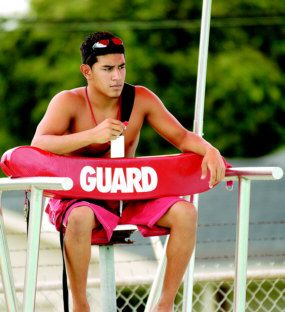Lifeguarding is often seen as a summer job, but it’s so much more than that. These dedicated professionals play a crucial role in ensuring the safety of swimmers in various environments, from tranquil pools to the unpredictable ocean life guard. In this blog post, we’ll explore the different types of lifeguards, their roles, and the unique challenges they face in their respective settings.

1. Pool Lifeguards
Role and Responsibilities
Pool lifeguards are the most recognizable type of lifeguard, often found at public swimming pools, hotels, and water parks. Their primary responsibilities include monitoring swimmers, enforcing pool rules, and performing rescues when necessary.
Skills Required
- Vigilance: Constantly scanning the water for potential dangers.
- First Aid Certification: Must be trained in CPR and emergency response.
- Communication: Effectively conveying rules and instructions to guests.
Challenges
While pool environments are generally more controlled, lifeguards still face challenges such as overcrowding, managing unruly guests, and dealing with medical emergencies like heat-related illnesses.
2. Ocean Lifeguards
Role and Responsibilities
Ocean lifeguards work at beaches and coastal areas, where the conditions can change rapidly. Their duties include monitoring surf conditions, rescuing swimmers caught in rip currents, and providing first aid.
Skills Required
- Strong Swimming Skills: Must be proficient in open water swimming.
- Knowledge of Water Conditions: Understanding tides, currents, and local wildlife.
- Rescue Techniques: Trained in using rescue boards, boats, and other equipment.
Challenges
Ocean lifeguards face unique challenges, such as dealing with changing weather conditions, large crowds, and the inherent unpredictability of ocean currents. They must also be prepared for emergencies involving jellyfish stings, shark sightings, or other wildlife encounters.
3. Water Park Lifeguards
Role and Responsibilities
Water park lifeguards oversee guests in a variety of aquatic attractions, including slides, lazy rivers, and wave pools. Their focus is on ensuring the safety of guests in a dynamic environment.
Skills Required
- Diverse Skill Set: Ability to monitor different types of attractions and respond to unique situations.
- Team Coordination: Often work closely with other lifeguards and park staff to manage large crowds.
Challenges
Water parks can be overwhelming, with high energy levels and fast-paced activities. Lifeguards must stay alert to potential accidents, slips, and the need for quick rescues in crowded areas.
4. Special Event Lifeguards
Role and Responsibilities
Special event lifeguards are hired for specific occasions, such as triathlons, charity swims, or community pool parties. Their role is to ensure the safety of participants and spectators during these events.
Skills Required
- Adaptability: Ability to quickly assess and respond to varying environments.
- Event-Specific Knowledge: Familiarity with the specifics of the event, including potential hazards.
Challenges
These lifeguards must be prepared for any scenario, from managing large groups to dealing with unexpected emergencies. The temporary nature of their work can also mean less familiarity with the environment.
5. Surf Lifeguards
Role and Responsibilities
Surf lifeguards are specialized ocean lifeguards who work in areas known for surfing. They are responsible for monitoring both swimmers and surfers, ensuring that everyone remains safe in potentially hazardous conditions.
Skills Required
- Expert Swimming Ability: Must navigate waves and currents effectively.
- Surfing Knowledge: Understanding surf conditions and how they affect both swimmers and surfers.
Challenges
Surf lifeguards often deal with larger waves and more unpredictable conditions than traditional ocean lifeguards. They must be adept at making quick decisions in the face of changing surf patterns.
Conclusion
Lifeguarding is a diverse field, with each type of lifeguard facing unique challenges and responsibilities. Whether you’re lounging by a pool or surfing in the ocean, lifeguards are there to ensure your safety. Understanding the various types of lifeguards can help you appreciate the hard work and dedication they put into keeping our waters safe.
